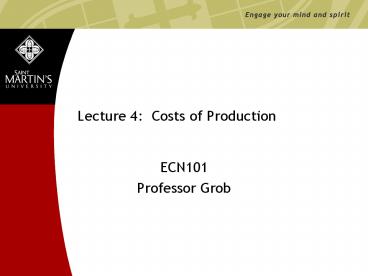Lecture 4: Costs of Production - PowerPoint PPT Presentation
1 / 13
Title:
Lecture 4: Costs of Production
Description:
What is the difference between average and marginal cost. The ... Large companies can be too inflexible for conversion of products or facilities (e.g. textiles) ... – PowerPoint PPT presentation
Number of Views:50
Avg rating:3.0/5.0
Title: Lecture 4: Costs of Production
1
Lecture 4 Costs of Production
- ECN101
- Professor Grob
2
Expectations
- Long run vs. Short run in Economic terms
- Production Total product marginal product
graphs - Law of diminishing marginal returns
- Effects of a productivity enhancement
- What is the difference between average and
marginal cost
3
The Long Run Versus the Short Run
- In the short run, costs are fixed and variable
- In the long run, all costs are variable
4
PRODUCTION TABLE
Labor input Total product Marginal
product (workers per day) (output per
day) (output per day) 0 0 1 1,000 1,000 2
2,200 1,200 3 3,500 1,300 4 4,700 1,200
5 5,800 1,100
NOTE ON THIS TABLE WE HAVE INFORMATION ON
INPUTS AND OUTPUT ONLYNOT COST OF PRODUCTION
5
Total product curve
Marginal product curve
Total product
Marginal product
Diminishing marginal returns
Increasing marginal returns
TP
5800
4700
1300
1200
MP
3500
1100
1000
2200
1000
Labor input
Labor input
6
Law of diminishing marginal returns
- At some point, the marginal product falls as
additional units are added - More inputs yield additional output at a smaller
rate than before - Too many cooks in the kitchen
7
Effects of a Productivity Enhancement
Increase in total product curve
Increase in marginal product curve
TP1
Total product
Marginal product
TP0
MP1
MP0
8
Now, lets talk about costs of production
- Total cost
- Average total cost
- Marginal cost
9
Average variable cost plus average fixed cost
gives us the average total cost
Total variable cost and total fixed cost gives us
total cost
Average total cost
Total Cost
Costs
Total cost
Total variable cost
Average variable cost
Total fixed cost
Marginal cost
50
The change in total cost when one more unit is
produced is the marginal cost
10
What is the difference between average total cost
and marginal cost?
- Average total cost is the total cost per unit of
output
- Marginal cost is the change in total cost when
one more additional unit of output is produced
11
Profit Total revenue costs
- Accountants count explicit costs ()
- Economists count explicit and implicit costs
12
Is bigger production better?
- Pros
- Mass production and standardization can meet
large demand - (e.g. Ford)
- Economies of scale
- Capture gains quickly
- Cons
- Large companies can be too inflexible for
conversion of products or facilities (e.g.
textiles) - Cant meet specialized tastes of consumers (e.g.
microbrews)
13
Next time
- Monopolies
- Monopolistic game































